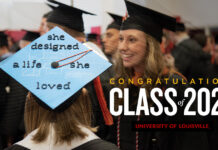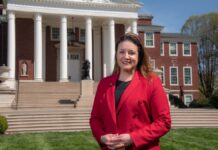
A University of Louisville program designed to help accelerate scholarship and elevate the national profile of exceptional faculty has selected ten scholars to its fifth cohort. Through the Ascending Star Fellowship program, the Office of Research and Innovation partners with academic units to help advance mid-career faculty.
Over the course of a year, fellows collaborate with an external mentor and pursue an ambitious scholarly project aimed at advancing their research to the next level. This year’s class includes:
- Dereck Barr-Pulliam, College of Business, focusing on how individuals solve complex problems in auditing and accounting contexts.
- Chris Brody, School of Music, analyzing musical form in tonal and Baroque music, using corpus-based methods to study structure and style.
- Marci DeCaro, College of Arts and Sciences, exploring the cognitive processes underlying learning and performance, emphasizing how insights from cognitive science can improve educational instruction.
- Minjie Huang, College of Business, studying executive compensation, corporate culture, investments and behavioral finance.
- Heehyul Moon, Raymond A. Kent School of Social Work & Family Science, researching health disparities, dementia caregiving and service utilization among racially and culturally marginalized older adults.
- John Ritz, School of Music, using electroacoustic music and interactive computer systems to create innovative chamber and experimental works that integrate live performance with technology.
- Caroline Sheffield, College of Education and Human Development, working on multimodal literacy in social studies education, the integration of technology in classroom instruction and site-based teacher education.
- Susan Tanner, Brandeis School of Law, studying the intersection of artificial intelligence, linguistics and law.
- Hui Wang, B. Speed School of Engineering, focusing on energy storage materials and solid-state battery technologies.
- Alex Widdowson, College of Arts and Sciences, studying the development of crime over the life course, the long-term consequences of criminal behavior and justice system involvement, and prisoner reentry.
To be considered for the program, faculty must be associate professor rank, nominated by their unit and show a “consistent record of scholarship with the passion and desire to achieve greater national recognition.”




























